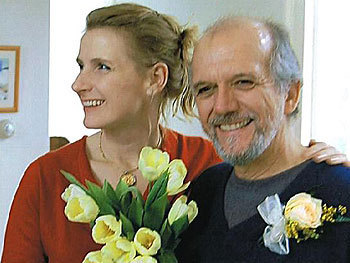Fans far and wide reacted to Eat, Pray, Love author Elizabeth Gilbert’s announcement last week that she and her companion of 12 years and husband of 9 years, Jose Nunes (aka Felipe in her best-selling book), are separating. 
It’s never an easy decision, even for a woman who so publicly wrote about the demise of her first marriage in a book and then addressed her reluctance to tie the knot again in her 2010 follow-up book, Committed: A Skeptic Makes Peace with Marriage, but ultimately did in order to keep him in the States.
In a long post on Facebook, Gilbert, who’ll be 47 this month, wrote, in part:
Our split is very amicable. Our reasons are very personal. At this time of transition, I hope you will respect our privacy. In my heart, I know that you will do so, because I trust that you understand how this is a story that I am living — not a story that I am telling.
I am not a fan of Eat, Pray, Love, but I am a huge fan of Gilbert herself. I was lucky to have interviewed her twice — when Committed was published and when she republished her great-grandmother’s cookbook, a benefit for Dave Egger’s program that helps under-resourced students go to college — and saw her talk locally once. Each time, she came across as genuine, grounded, generous and self-effacing.
And so I understand her request to respect their privacy because, as she writes, the reasons for their split are “very personal.” Honestly, what split is not “very personal”? Every split is. Although I can imagine a time when there will be an “exclusive” (perhaps with Oprah) in which Gilbert “finally opens up” about what went “wrong.”
Looking for reasons
Because we believe the only reason people split is because something’s wrong, even if the split means there was growth or the relationship accomplished what the couple wanted from it. For some reason, we see longevity as the only way to measure a relationship’s success. So when a relationship ends, we look for reasons we can understand because it’s scary to think that the people we look up to as getting it right — whatever the it is — are no better at it than we are.
Some might question whether the 17-year age difference was the problem. (“Sometimes I feel sorry for him; my energy is so tiresome for him,” she told me.) Some might question the fact that they wed for the most part to keep him in the States — not quite a green card marriage but he most definitely needed the green card if they were going to live in the same country. Some might question whether their childfree relationship led to a split — childfree couples tend to divorce more than those with children. They don’t have children together — Gilbert has famously said she was never interested in having children — but Nunes is a dad. Some might question if the problem was the fact that it’s a second marriage for both, which often has a more dismal divorce record than a first marriage but not always; some second marriages struggle because blending families with young children can be a challenge more than anything else. Others might question if it’s because she’s admitted to being a seduction addict. Well …
When I spoke to Gilbert, she was very clear that she was doing things differently in her second marriage — a prenup for one (her first divorce cost her a lot of money). She also said she was a different person and was marrying a partner who was better suited to her. Sharing that she and fellow author and friend Ann Patchett both had older husbands who absolutely adored them (Patchett’s second husband is 16 years older than she), she said they often joked that if they couldn’t make their marriages work, well, no marriage would work.
And yet …
Marrying older … and smarter?
In an interview with Patchett in the Wall Street Journal when Committed was published, Gilbert talks about the beauty of marrying later in life:
Marriage is a strange combination of dream and reality, and we spend our lives as couples trying to negotiate that divide. I will say this, because I think it is the single most important piece of information in the whole story: Marriage is not a game for the young. … Maturity brings — among other things — the ability to sustain and survive enormous contradictions and disappointments. Marriage is — among other things — a study in contradiction and disappointment, and inside that reality there is space for us to truly learn how to love. But it is wise to check at least a few of our most idealistic youthful dreams at the door before entering.
I agree with her, to a point. Ultimately, to me, the “single most important piece of information” is this: There are no guarantees, maturity or not. Marry young, marry old, marry for love, marry for kids, marry once, marry twice — nothing’s a given. But that doesn’t mean the relationship was for naught — we may have experienced wonderful love and growth and happiness within it.
A good friend tied the knot again last year, another is about to do so in a few weeks. Both are in their 50s with grown children, older for sure and presumably wiser this time around. Neither has questioned the institution, as Gilbert has; they just want to spend the rest of their lives with their respective partners and believe marriage is the best way to do that. They may not have “idealistic youthful dreams” anymore, but they have dreams nonetheless. Maybe that’s the most we can hope for.
Interested in re-creating your marriage? Order “The New I Do: Reshaping Marriage for Skeptics, Realists and Rebels” on Amazon, and follow TNID on Twitter and Facebook.
















